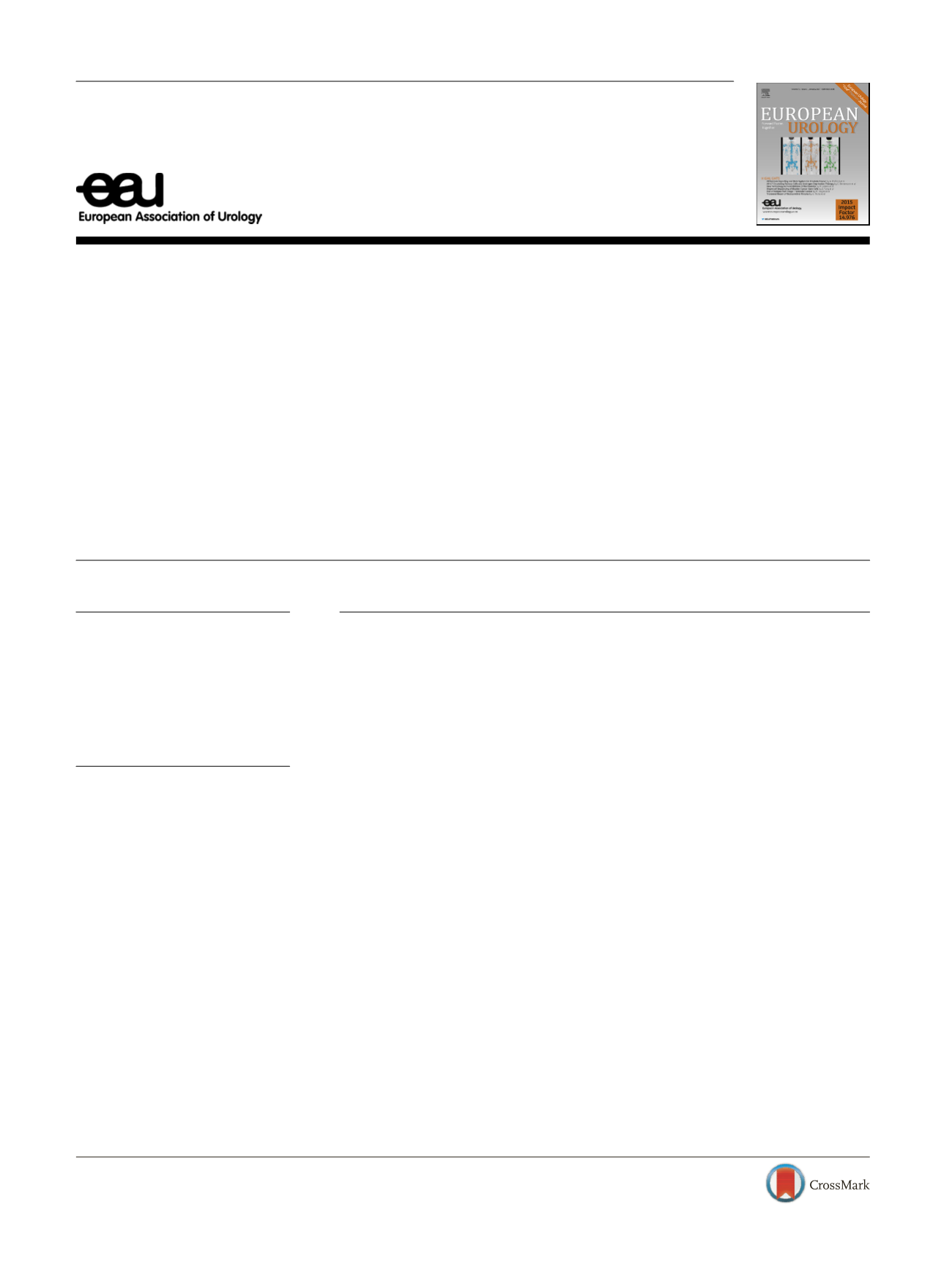

Prostate Cancer
AR-V7 in Peripheral Whole Blood of Patients with
Castration-resistant Prostate Cancer: Association with
Treatment-specific Outcome Under Abiraterone and Enzalutamide
Anna Katharina Seitz
a , e[3_TD$DIFF]
, y ,Silvia Thoene
b[4_TD$DIFF]
, c , d , y ,Andreas Bietenbeck
b ,Roman Nawroth
a ,Robert Tauber
a ,Mark Thalgott
a ,Sebastian Schmid
a ,Ramona Secci
b , c , d ,Margitta Retz
a ,Ju¨rgen E. Gschwend
a ,Ju¨rgen Ruland
b , c , d ,Christof Winter
b , c[1_TD$DIFF]
, d[5_TD$DIFF]
, z , ** ,Matthias M. Heck
a , z , *a
Department of Urology, Klinikum rechts der Isar, Technical University of Munich, Germany;
b
Institute of Clinical Chemistry and Pathobiochemistry,
Klinikum rechts der Isar, Technical
[7_TD$DIFF]
University
[8_TD$DIFF]
of Munich, Munich, Germany;
c
German Cancer Consortium,
[9_TD$DIFF]
partner site Munich, Germany;
d
German Cancer
Research Center, Heidelberg, Germany;
e
Current address: Department of Urology, University Hospital of Würzburg, Germany.
E U R O P E A N U R O L O GY 7 2 ( 2 0 17 ) 8 2 8 – 8 3 4available at
www.scienced irect.comjournal homepage:
www.europeanurology.comArticle info
Article history:
Accepted July 20, 2017
Associate Editor:
Giacomo Novara
Statistical Editor:
Andrew Vickers
Keywords:
Androgen receptor splice variant
Resistance
Castration-resistant prostate
cancer
Liquid profiling
Droplet digital polymerase chain
reaction
Abstract
Background:
It has been demonstrated that androgen receptor splice variant 7 (AR-V7)
expression in circulating tumor cells (CTCs) predicts poor treatment response in
metastatic castration-resistant prostate cancer (mCRPC) patients treated with abirater-
one or enzalutamide.
Objective:
To develop a practical and robust liquid pro
fi
ling approach for direct quanti-
fi
cation of AR-V7 in peripheral whole blood without the need for CTC capture and to
determine its potential for predicting treatment response in mCRPC patients.
Design, setting, and participants:
Whole blood samples from a prospective bioreposi-
tory of 85 mCRPC patients before treatment initiation with abiraterone (
n
= 56) or
enzalutamide (
n
= 29) were analyzed via droplet digital polymerase chain reaction.
Outcome measurements and statistical analysis:
The association of AR-V7 status with
prostate-speci
fi
c antigen (PSA) response de
fi
ned by PSA decline 50% and with PSA
–
progression-free survival (PSA-PFS), clinical PFS, and overall survival (OS) was assessed.
Results and limitations:
High AR-V7 expression levels inwhole blood were detectable in
18% (15/85) of patients. No patient with high AR-V7 expression achieved a PSA response,
and AR-V7 status was an independent predictor of PSA response in multivariable logistic
regression analysis (
p
= 0.03). High AR-V7 expression was associated with shorter PSA-
PFS (median 2.4 vs 3.7 mo;
p
<
0.001), shorter clinical PFS (median 2.7 vs 5.5 mo;
p
<
0.001), and shorter OS (median 4.0 vs. 13.9 mo;
p
<
0.001). On multivariable Cox
regression analysis, high AR-V7 expression remained an independent predictor of
shorter PSA-PFS (hazard ratio [HR] 7.0, 95% con
fi
dence interval [CI] 2.3
–
20.7;
p
<
0.001), shorter clinical PFS (HR 2.3, 95% CI 1.1
–
4.9;
p
= 0.02), and shorter OS (HR
3.0, 95%
[15_TD$DIFF]
CI 1.4
–
6.3;
p
= 0.005).
y
These authors contributed equally to this work.
z
These authors share senior authorship.
** Corresponding author. Institute of Clinical Chemistry and Pathobiochemistry, Klinikum rechts der
Isar, Technical University of Munich, Ismaninger Strasse 22, 81675 Munich, Germany.
Tel. +49 89 41404765.
E-mail address:
christof.winter@tum.de(C. Winter).
* Corresponding author. Department of Urology, Klinikum rechts der Isar, Technical University of
Munich, Ismaninger Strasse 22, 81675 Munich, Germany. Tel. +49 89 41402520;
Fax: +49 89 41404843.
E-mail address:
matthias.heck@tum.de(M.M. Heck).
http://dx.doi.org/j.eururo.2017.07.024/j.eururo.2017.07.0240302-2838/© 2017 European Association of Urology. Published by Elsevier B.V. All rights reserved.
















